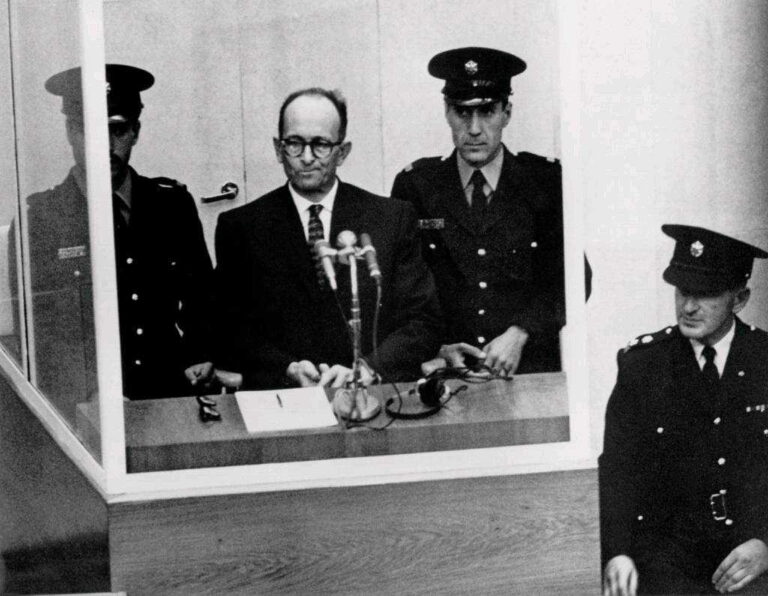
What Happened?
Last week: New movie Operation Finale hit theaters. The movie, starring Ben Kingsley as Adolf Eichmann and Oscar Isaac as Mossad agent Peter Malkin, tells the story of a pivotal moment in Israel’s history: the trial of Nazi war criminal Adolf Eichmann.
In the 1940’s: Adolf Eichmann, born in Germany in 1906, joined the Nazi party in 1932 and rose through the ranks to become Nazi Lieutenant Colonel and one of Adolf Hitler’s top deputies. Eichmann, known as the “Architect of the Holocaust,” was chiefly responsible for the deportation and mass extermination of 6 million Eastern European Jews during WWII. In 1945, Eichmann reportedly said, “I will leap into my grave laughing because the feeling that I have five million human beings on my conscience is for me a source of extraordinary satisfaction.”
In the 1960’s: In the years after the Holocaust, Eichmann escaped to Argentina, where he was living under the name “Ricardo Klement.” Israel’s young Mossad intelligence agency tracked Eichmann down in Argentina, which became the asylum for many former Nazi war criminals, captured him and brought him to Israel for trial. On May 23, 1960, Israeli Prime Minister David Ben Gurion announced before the Knesset: “One of the greatest Nazi war criminals, Adolf Eichmann, who was responsible for what they called the Final Solution. He is under arrest in Israel and will be placed on trial shortly under the terms of the Law for the Trial of Nazis and their collaborators.” The Knesset members, often divided, were ecstatic. While this was the general popular opinion, not every Jewish leader agreed with Ben Gurion. Many Jewish intellectuals and leaders advised against holding the trial in Israel. British-Jewish philosopher Isaiah Berlin questioned the motives behind the trial: “[Is the purpose] to remind the Jews that they are one and that they are in danger in the Diaspora? They either know or don’t know this; and this won’t convert anyone.”
After months of interrogations, the whole world watched as Eichmann’s trial began in April 1961. Over 100 Holocaust survivors presented their testimonies and hundreds of documents were reviewed. In December 1961, Eichmann was found guilty of 15 criminal charges, including crimes against humanity, crimes against the Jewish people and war crimes. After a debate among the Knesset cabinet, two of the 13 ministers preferred Eichman be committed to life in prison, but the others supported the death sentence. Golda Meir, who always opposed capital punishment, in this instance supported it, saying, “There has been a trial, there has been a ruling in accordance with the law of the State of Israel.” Eichmann was sentenced to death and he was hanged on June 1, 1962 – the only death sentence to be carried out in the State of Israel’s history (except for IDF soldier Meir Tabiansky, who was falsely accused of espionage six weeks after Israel declared statehood and was ultimately exonerated).
Why Does This Matter?
Israel grapples with Holocaust: At the beginning of the State of Israel, the Holocaust was not really spoken about and, 13 years after declaring a state, Israeli society engaged with the horrors of the Holocaust in a public way for the first time via the Eichmann trial. Until then, survivors were often quiet about their experience, and those who were born in pre-state Israel or came from non-European countries did not understand, or even ignored or looked down upon, survivors and their pasts. Israelis began to comprehend the magnitude and atrocity of this genocide.
Israel as representative of Jewish people? This episode begs the interesting question: why did Israel take responsibility for Eichmann’s capture and trial? After all, Eichmann’s crimes took place in Europe before the State of Israel even existed. It seems that Israel viewed itself as a representative of the entire Jewish people. The American Jewish Committee (AJC) led by Jacob Blaustein was upset that the Israeli government decided to do this, arguing that Eichman should be tried in Germany for an international tribunal because the Nazis committed “unspeakable crimes against humanity, not only against Jews.” Ben Gurion took to the New York Times the following December, declaring, “Only a Jew with an inferiority complex could say that; only one who does not realize that a Jew is a human being.” This debate sparked a fight between Blaustein and Ben Gurion who, 10 years earlier, had agreed to the Blaustein-Ben Gurion agreement, which determined that Israel would not interfere with the internal affairs of other Jewish communities, among other provisions.
Israel on the world stage: UN Security Council Resolution 132 stated that Israel violated Argentina’s sovereignty, and the US, Britain, France and the Soviet Union also condemned Israel, fearful that this would set a precedent for other countries to invade other sovereign lands, which could undermine international peace. The Washington Post condemned Israel for “wanting to wreak vengeance,” and the New York Times acknowledged “the heinousness of Eichmann’s crimes” but lamented Israel’s violating Argentina’s sovereignty.
Diversity of Perspectives within Israel
The Jerusalem Post summarizes the film’s critical reviews, some positive and others negative. On the one hand, critics praise the film for highlighting the complexity of the situation, while others say the film is predictable and casts Eichmann in too sympathetic a light. Times of Israel writer Matt Lebovic criticized the film for how it “humanizes its notorious antagonist and allows his deceptions to go unchallenged.” In a Hebrew interview with Arutz Sheva, former Mossad agent and advisor to the film Avner Avraham explains that the film purposely presents Eichmann sympathetically in order to show that any regular person can carry out terrible deeds, including Eichmann and countless others during the Holocaust.
Opinions aside, one thing that excited many Israelis was that Israeli Fauda star Lior Raz played the supporting role of Mossad director Isser Harel, in his English language debut.
Originally Published Sep 6, 2018 05:14PM EDT


